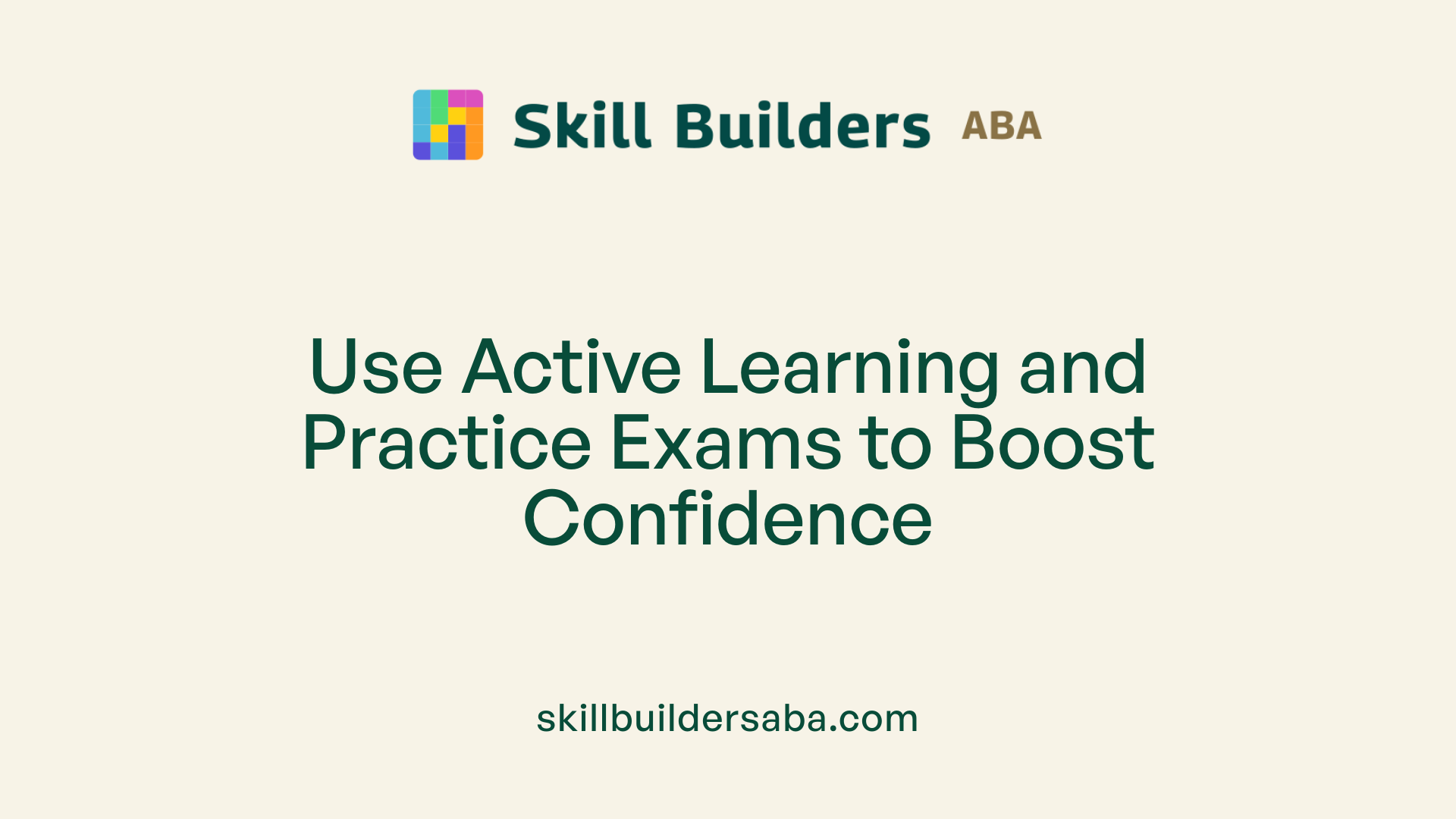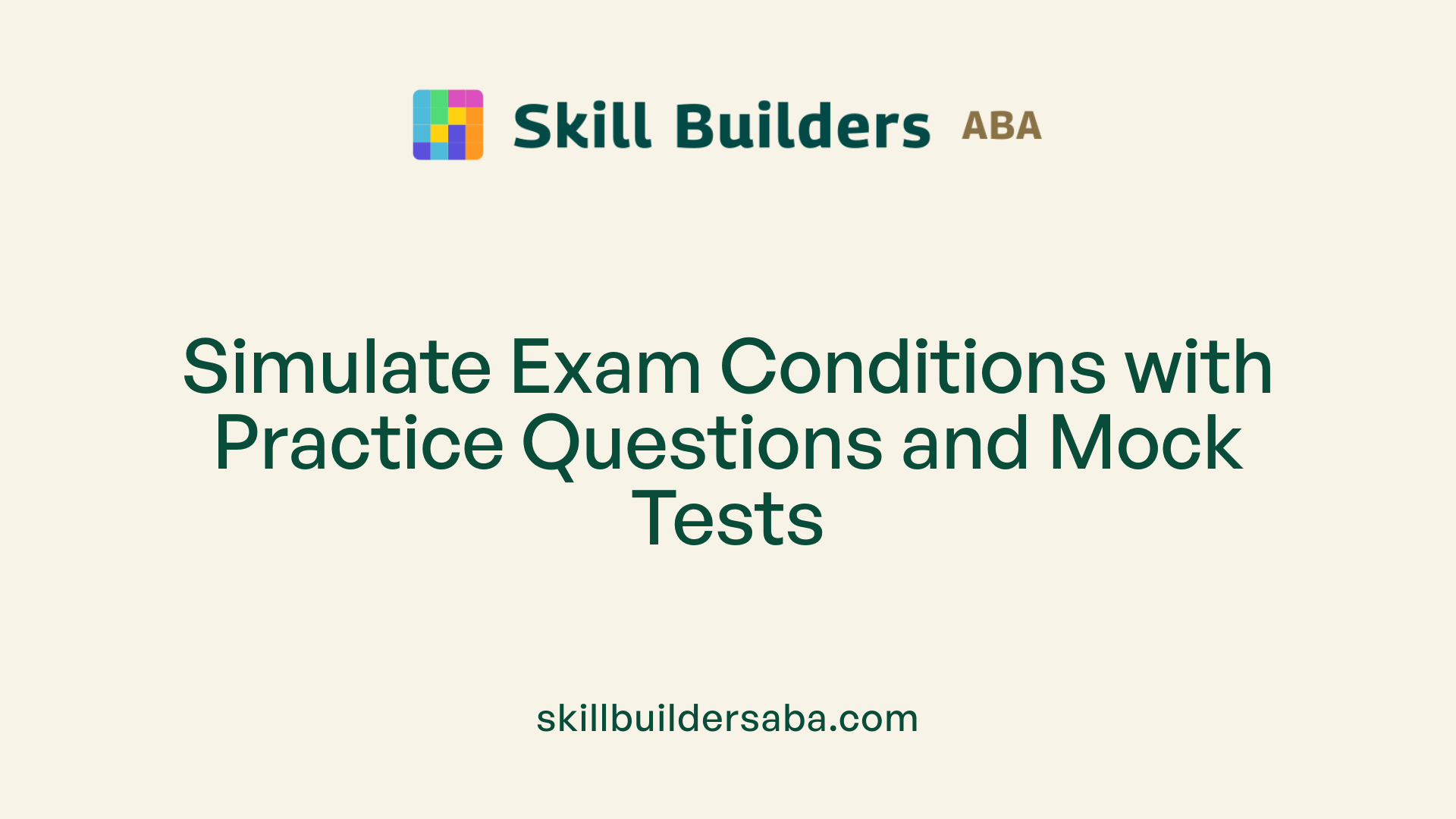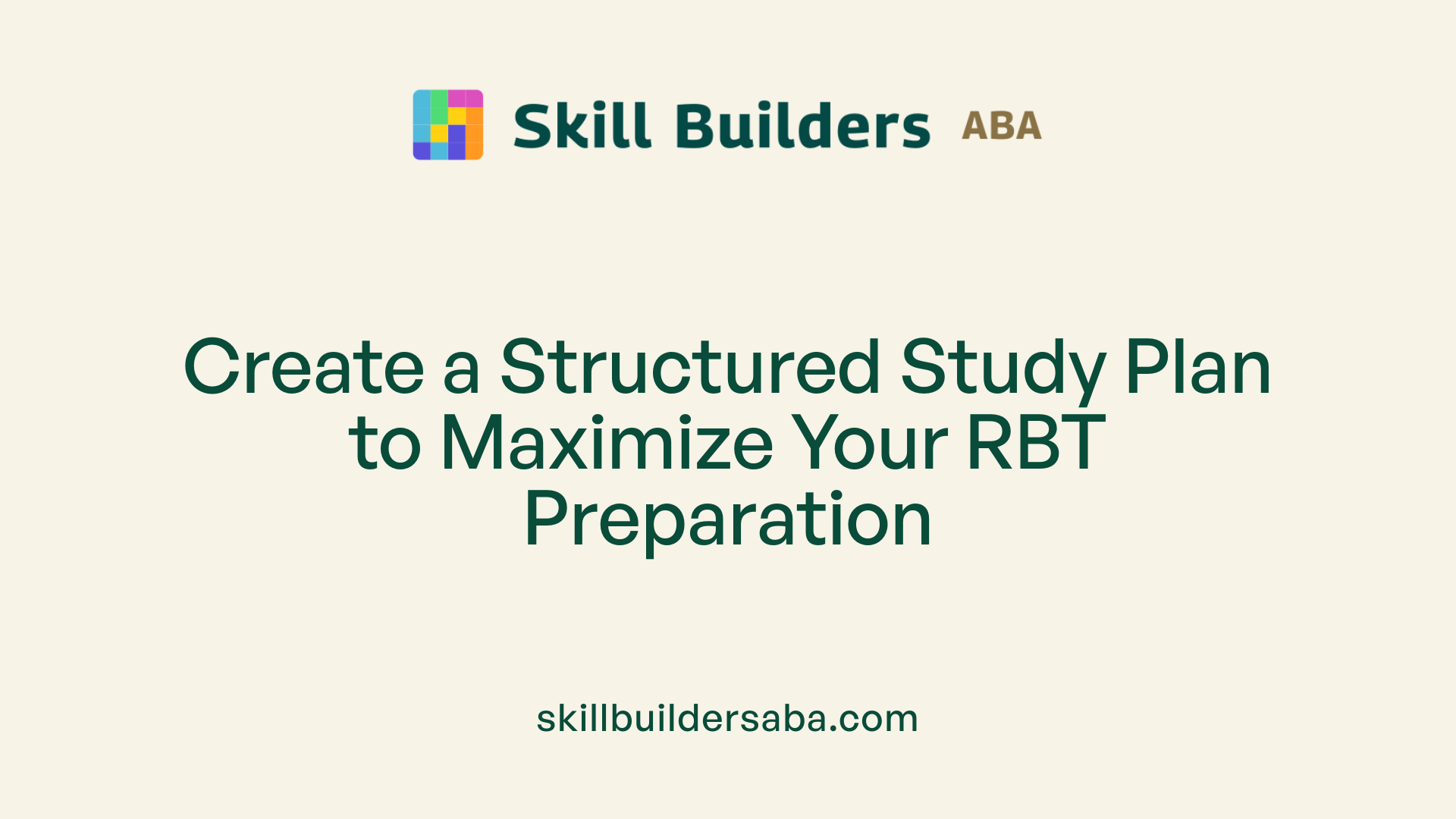RBT Exam Study Guide
Mastering the RBT Exam: Your Comprehensive Guide to Success

Getting Started with the RBT Exam Preparation
Preparing for the Registered Behavior Technician (RBT) exam requires a strategic approach utilizing a variety of study resources, understanding exam content, and developing effective study habits. This guide offers a thorough overview of available resources, key topics, study techniques, and test-taking strategies to help candidates achieve their certification goals.
Available Resources for RBT Exam Preparation
Preparing for the Registered Behavior Technician (RBT) exam requires a solid understanding of the core areas related to Autism Spectrum Disorder (ASD), applied behavior analysis (ABA), ethical considerations, and intervention strategies.
Types of Study Guides are essential tools to grasp fundamental concepts. The RBT Study Guide covers important domains such as Social Communication, Social Interaction, and Restrictive, repetitive patterns of behavior. It explains the principles of ABA, including behavior analysis, consequences, and treatment components. Additionally, it details the roles of RBTs and the elements of Behavior Intervention Plans (BIPs). These guides often summarize data collection methods, assessment procedures, and specific intervention strategies like Discrete Trial Training (DTT), Natural Environment Teaching (NET), Discrimination Training, and Functional Communication Training.
Practice Questions and Sample Tests are invaluable for exam readiness. They provide a simulated testing environment, helping candidates become familiar with question formats and timing. Many online platforms offer practice exams designed to mirror the actual test structure, highlighting areas where further review is needed.
Online Courses and Digital Tools have become increasingly popular. They often include interactive modules, video lessons, and quizzes to reinforce learning. These courses are accessible from anywhere, making flexible study schedules possible. Popular options range from free resources to paid courses, which can cost anywhere from $29 to several hundred dollars depending on the depth and comprehensiveness.
Cost and Availability of Study Aids vary broadly. Free resources are available through professional behavior analysis organizations and some educational institutions. Paid options include comprehensive courses, guides, and practice exams that offer more in-depth instruction and personalized feedback. Many training providers also offer bundle packages that combine multiple study aids for a discounted rate.
Scholarships and Financial Aid Options can help reduce the financial burden. Some organizations and employers offer sponsorships or grants for candidates pursuing certification. Additionally, certain scholarships are specifically aimed at supporting students and professionals in the behavior analysis field.
| Resource Type | Typical Cost Range | Description | Additional Notes |
|---|---|---|---|
| Study Guides | Free - $50 | Summarize exam content | Often include diagrams and key concepts |
| Practice Tests | Free - $100 | Simulate exam conditions | Focused on question style and timing |
| Online Courses | Free - $500+ | Interactive learning | Varies based on provider and features |
| Financial Aid | N/A | Scholarships, grants | Check with organizations like BACB |
Using a strategic combination of these resources, alongside review of ethical standards and supervised practice, can significantly boost your confidence and preparedness for the RBT exam.
Core Topics Covered in the RBT Exam
What are the key topics covered in the RBT exam?
The Registered Behavior Technician (RBT) exam tests a candidate's knowledge across several important areas essential for effective practice in behavior analysis. These areas include understanding behavior assessment and measurement techniques, which involve collecting and analyzing data to inform intervention plans.
Candidates must be familiar with skill acquisition strategies, such as Discrete Trial Training (DTT), Natural Environment Teaching (NET), and Discrimination Training. These methods help clients develop new skills in a structured yet flexible manner. Behavior reduction techniques are also a critical component, involving strategies to decrease challenging or harmful behaviors.
A significant focus is placed on documentation and professional reporting. RBTs are expected to accurately record data and understand the importance of maintaining detailed, confidential records that support ongoing client progress. Ethical standards are explicitly emphasized, highlighting the importance of client dignity, confidentiality, and mandated reporting procedures.
Understanding the scope of practice in ABA is crucial. RBTs need to know their roles and responsibilities, including implementing Behavior Intervention Plans (BIPs) designed by supervisors. The exam also assesses familiarity with foundational ABA principles such as positive reinforcement, the consequences of behavior, and the importance of ethical considerations.
Topics like assessment procedures, data collection methods, and intervention strategies form a core part of the exam, ensuring that candidates have both theoretical knowledge and the practical skills necessary for effective intervention. Additionally, candidates are tested on their understanding of ongoing education requirements, costs of training, and processes for exam renewal.
Overall, the exam covers a broad range of topics to ensure that RBTs are equipped to deliver ethical, competent, and effective behavioral services—making sure they understand and can apply the principles of ABA in real-world settings.
Below is a quick overview of the main areas:
| Topic | Focus | Details |
|---|---|---|
| Behavior Assessment & Measurement | Data collection methods | Techniques like direct observation, frequency recording, duration measurement |
| Skill Acquisition Strategies | Teaching new skills | DTT, NET, Discrimination Training |
| Behavior Reduction | Decreasing problematic behaviors | Functional Communication Training, reinforcement strategies |
| Documentation & Reporting | Record-keeping | Maintaining confidentiality, accuracy, and timeliness |
| Ethical Standards | Professional conduct | Client dignity, mandated reporting, confidentiality |
| Scope of Practice | Role boundaries | Implementing BIPs, supervision requirements |
Candidates preparing for the RBT exam should focus on these areas to demonstrate their readiness to support individuals with ASD responsibly and ethically.
Effective Strategies for RBT Exam Preparation

How can I effectively prepare for the RBT exam?
Preparing for the Registered Behavior Technician (RBT) exam involves a strategic approach focused on understanding core concepts related to Autism Spectrum Disorder (ASD), applied behavior analysis (ABA), and professional standards.
Start with a structured study plan that emphasizes the six core areas outlined in the RBT Task List. These areas include skill acquisition, behavior reduction, documentation, ethics, and more. Since skill acquisition makes up about 32% of the exam, dedicate extra time to understanding techniques like Discrete Trial Training (DTT), Natural Environment Teaching (NET), and Functional Communication Training.
Complete the 40-hour training required by the Behavior Analyst Certification Board (BACB) and supplement this with practice questions that mimic the exam's multiple-choice format. Timed practice exams can help you get comfortable with pacing and improve your test-taking confidence.
Active learning techniques such as creating flashcards, participating in group discussions, and teaching concepts to peers reinforce understanding of critical topics like ethics, confidentiality, client dignity, and the responsibilities of RBTs. These areas are essential, as the exam also assesses your knowledge of ethical guidelines and mandated reporting.
Utilize study groups and peer support for motivation and clarification of complex topics. Engaging with others helps clarify difficult concepts and offers different perspectives that enhance learning.
Finally, prepare for the logistics of exam day by scheduling your test through Pearson VUE, understanding the testing process, and budgeting for exam fees. Allow enough time for review and retaking the test if needed, ensuring a well-rounded preparation process.
| Study Area | Focus Points | Additional Tips |
|---|---|---|
| Core Content | ASD domains, ABA principles, BIPs, intervention strategies | Use the RBT Task List as a guide |
| Ethical and Professional | Ethics, confidentiality, client dignity, mandated reporting | Regular review of BACB guidelines |
| Data Collection & Assessment | Data methods, assessment procedures, treatment strategies | Practice documentation exercises |
| Practice & Pacing | Timed exams, practice questions, mock tests | Simulate exam conditions |
By combining structured study, active learning, and practice exams, you can enhance your readiness and confidence for the RBT exam.
Utilizing Practice Questions and Mock Exams
 Practicing with sample test questions and mock exams is a highly effective way to prepare for the Registered Behavior Technician (RBT) exam. These resources help candidates familiarize themselves with the exam format, question style, and content areas, reducing anxiety and improving overall performance.
Practicing with sample test questions and mock exams is a highly effective way to prepare for the Registered Behavior Technician (RBT) exam. These resources help candidates familiarize themselves with the exam format, question style, and content areas, reducing anxiety and improving overall performance.
Many online platforms offer free practice questions that specifically target the core domains covered in the RBT Study Guide. These include topics like Social Communication, Social Interaction, and Restrictive, repetitive behaviors associated with autism spectrum disorder (ASD). Additionally, simulation of real exam conditions through mock tests can enhance test-taking skills, such as managing time effectively and understanding question phrasing.
Using practice questions also helps identify areas where knowledge might be weak. For instance, if a candidate consistently struggles with questions related to Behavior Intervention Plans or ethical standards, they can focus their study efforts more efficiently. Regularly reviewing these areas leads to increased confidence and accuracy.
Improving time management skills is another benefit of working with mock exams. Since the RBT exam has a fixed time limit, practicing under timed conditions ensures that test-takers can answer questions efficiently and avoid last-minute rushes.
For optimal preparation, consider searching for free practice questions, online mock exams, and useful study apps. Such resources often include detailed answer explanations, allowing candidates to learn from their mistakes and reinforce their understanding of topics like data collection, assessment procedures, and intervention strategies such as Discrimination Training or Functional Communication Training.
| Resource Type | Description | Additional Tips |
|---|---|---|
| Practice questions | Focused questions on core domains | Use frequently to test knowledge |
| Mock exams | Simulated testing environments | Practice under timed conditions |
| Study apps | Interactive study tools | Track progress and identify weaknesses |
| Study groups | Collaborative learning sessions | Discuss questions and refine understanding |
By actively utilizing these tools, aspiring RBTs can build confidence, improve their knowledge base, and increase their chances of success on the exam—ultimately supporting their goal of becoming a competent behavior technician.
Choosing the Right RBT Study Resources
 Selecting an effective study guide for Registered Behavior Technician (RBT) certification can significantly impact your success. It’s important to compare different material options based on several criteria to ensure you choose the best fit for your learning needs.
Selecting an effective study guide for Registered Behavior Technician (RBT) certification can significantly impact your success. It’s important to compare different material options based on several criteria to ensure you choose the best fit for your learning needs.
First, review the content coverage. A comprehensive guide should thoroughly address all three primary domains of ASE: Social Communication, Social Interaction, and Restrictive, repetitive patterns of behavior. It should also explain fundamental principles of Applied Behavior Analysis (ABA), including behavior analysis concepts, the importance of consequences, and core treatment components.
In addition, the best resources clearly outline the roles and responsibilities of RBTs, detail the parts of Behavior Intervention Plans (BIPs), and describe data collection methods, assessment procedures, and intervention strategies such as Discrete Trial Training (DTT), Natural Environment Teaching (NET), Discrimination Training, and Functional Communication Training.
Moreover, confirm that the study guide emphasizes ethics, confidentiality, client dignity, and mandated reporting—elements crucial to professional standards of behavior analysts.
When comparing study guides, consider their reputation and accreditation. Materials endorsed by or aligned with the Behavior Analyst Certification Board (BACB) tend to meet current standards and are regularly updated.
Another important factor is alignment with your learning style. Some learners benefit from interactive online courses, while others prefer reading, flashcards, or participating in study groups. Choose resources that match your preferred method of study to enhance retention and engagement.
Cost is also a major consideration. Budget-friendly options that provide a mix of practice questions, mock exams, and detailed explanations can be highly effective. Many high-quality guides include practice exams that simulate the test environment, helping you build confidence.
To help evaluate these factors, here is a comparison table summarizing typical features of popular RBT study resources:
| Resource Type | Content Coverage | Accreditation | Learning Style Fit | Cost | Practice Material | Additional Features |
|---|---|---|---|---|---|---|
| Book A | Complete, detailed | BACB-endorsed | Reading, self-study | Moderate | Yes, includes exams | Online quizzes, flashcards |
| Online Course B | Interactive, multimedia | Approved | Video lectures, interactive | Varies | Yes, extensive | Certification prep, instructor support |
| Flashcard Set C | Focused, quick review | Community recommendations | Quick review, on-the-go | Low | No | Mobile-friendly design |
In summary, choosing the right RBT study resource involves evaluating content depth, reputable backing, your preferred learning methods, and affordability. By considering these factors and using quality practice materials, you’ll be well on your way to passing the exam confidently.
Study Techniques and Time Management

Creating a Study Schedule
A structured study schedule is essential for efficient preparation. Break down the study material into manageable sections, and assign specific times to review each. Prioritize topics that you find most challenging, such as behavior assessment procedures or data collection methods. Regular, consistent study sessions help reinforce learning and build confidence.
Focus on Weak Areas
Identify your weak points through practice tests and self-assessment. Spend extra time reviewing concepts like behavior analysis, treatment components, and the responsibilities of RBTs. Use targeted resources like flashcards, summarizing key points, or discussing topics with peers to improve understanding. Focusing your effort on weaker areas boosts overall performance.
Active Recall and Spaced Repetition
Incorporate active recall by testing yourself frequently instead of passively rereading materials. Spaced repetition, which involves reviewing information at increasing intervals, helps solidify knowledge over time. Techniques like using digital flashcards or teaching concepts aloud can aid retention, especially for complex topics such as ABA principles or ethical considerations.
Practice Under Timed Conditions
Simulate real exam conditions by setting timers and completing practice questions within the allotted time. This approach helps improve time management during the actual test and reduces anxiety. Review your responses afterward, focusing on questions you missed, to understand errors and refine your strategies.
Tips for Effective RBT Exam Preparation
Familiarize yourself with the RBT task list and exam content outline to understand the key areas tested. Develop a detailed study plan that includes daily goals and diverse learning tools like practice exams, online courses, and study groups. Take consistent notes and utilize active learning methods such as quizzes and teaching others.
Manage your exam day by arriving early, ensuring you're rested and well-nourished. During the test, read questions carefully, manage your time wisely, and clarify any doubts if possible. In the final days before the exam, focus on reviewing core concepts and practicing exam-style questions. Good time management and strategic question analysis are vital for success.
Understanding the Format of the RBT Exam and Test Day Strategies
What is the format of the RBT exam, and how can I succeed on test day?
The Registered Behavior Technician (RBT) exam is structured to assess your knowledge across essential areas related to applied behavior analysis (ABA). It is a computer-based test lasting 90 minutes, consisting of 85 multiple-choice questions. Among these questions, 10 are unscored pilot questions used to evaluate future exam items. Each question offers four answer options, and the scoring requires a minimum of 200 out of 250 points to pass.
To perform well on test day, thorough preparation is crucial. Start by reviewing the RBT Task List, which outlines the core skills and knowledge areas tested. Studying important resources like the BACB Handbook and taking practice exams can help reinforce your understanding. It’s equally important to simulate the test environment by practicing under timed conditions; this enhances your time management skills and familiarizes you with the exam’s pacing.
Familiarize yourself with the testing process by reviewing tutorials provided by Pearson VUE, the official test administrator. Arriving early on the day of the exam can reduce anxiety and improve focus. Additionally, develop test-taking strategies such as reading questions carefully, eliminating obviously incorrect answers, and managing your stamina for the full test duration.
Consistent study routines, combined with stress-reduction techniques such as deep breathing, can greatly improve your confidence and performance. Remember, your goal is to understand how concepts like behavior analysis, consequences, and treatment components are applied, which is crucial for passing the exam and becoming a competent RBT.
Post-Exam Tips and Certification Maintenance
How do I pass the RBT exam on the first try?
Achieving success on your first attempt requires thorough preparation and understanding of the exam content. Focus on mastering the RBT Task List, which highlights essential knowledge areas such as ABA principles, assessment techniques, data collection methods, and ethical considerations.
Create a comprehensive study plan that includes a mix of active learning strategies. Using flashcards can help reinforce terminology and concepts, while practice exams allow you to familiarize yourself with the question format and improve your time management skills. Simulating exam conditions by taking timed mock tests can also boost your confidence.
Utilize reliable study resources like exam prep books, online courses, and practice tests. After each mock exam, review your answers to identify weak areas and focus your studies accordingly. Managing test anxiety through relaxation techniques and self-care routines is equally vital.
On exam day, ensure you are well-rested and arrive prepared. Consistent, deliberate study efforts combined with familiarity with the exam structure significantly increase your chances of passing on the first attempt.
Understanding exam results
Once you receive your exam results, review the detailed feedback if available. This insight can help you identify areas where you did well and topics that may require further review before retaking the test.
Next steps after passing
After successfully passing the exam, you should submit your certification application promptly and complete any required background checks. This step is crucial for obtaining your official RBT credential, which allows you to practice under supervision.
Renewal and continuing education requirements
Maintaining your RBT certification involves completing ongoing education hours—generally, a minimum of 5 hours of continuing education every year. These hours should include topics aligned with ethical standards, treatment procedures, and client confidentiality.
Maintaining ethical standards
Adhering to professional ethics is essential throughout your career. You are responsible for respecting client dignity, maintaining confidentiality, and following mandated reporting laws. Regularly reviewing the BACB's ethical guidelines ensures you uphold the highest professional standards and provide quality care.
Below is a summary table outlining these post-certification steps and requirements:
| Step | Requirement | Details |
|---|---|---|
| Exam Results | Review and understand | Check feedback to guide future learning |
| Next Steps | Submit application | Include documentation and background checks |
| Certification Renewal | Complete continuing education | 5 hours/year, focus on ethics and practice |
| Ethical Standards | Follow professional guidelines | Respect client dignity, confidentiality, mandated reporting |
Staying current with these steps will help you build a successful career as a Registered Behavior Technician and deliver quality services to clients.
Additional Tips for Ongoing Success in ABA Practice
How do I choose the right RBT study guide or resource?
Selecting an effective RBT study guide is crucial for thorough preparation. Ensure the resource covers all three main domains of ASD as outlined in the RBT Task List, including Social Communication, Social Interaction, and Repetitive Behaviors. It should include sections on the principles of ABA, data collection methods, and intervention strategies such as Discrete Trial Training (DTT), Natural Environment Teaching (NET), and Functional Communication Training.
The best study materials provide practice questions and mock exams that mimic the format of the official BACB RBT exam. This helps build confidence and familiarity with test structure. It’s also important to choose resources aligned with your preferred learning style—be it reading, interactive modules, video tutorials, or study groups.
Verify that the guide is current and reputable, preferably endorsed or recommended by professional organizations like the BACB. Budget considerations matter too; look for comprehensive packages offering a mix of reading materials, practice questions, and interactive content. This holistic approach ensures you're well-prepared and competent to apply ABA principles professionally.
Keep learning beyond the basics.
Ongoing education is vital to stay current with best practices. Continuous learning can involve taking advanced courses in behavioral analysis, attending workshops, or participating in online seminars. Staying updated on recent research and treatment innovations ensures you deliver the most effective interventions.
Engage in supervised fieldwork.
Hands-on experience under supervision reinforces your understanding and skills. Fieldwork allows you to apply theoretical knowledge in real-world settings, refine your data collection techniques, and receive constructive feedback from seasoned professionals.
Leverage community resources.
Many communities offer support groups, professional associations, and local training programs related to ABA. These resources enhance your knowledge base, provide networking opportunities, and expose you to a variety of client scenarios.
Reinforce ethical practice.
Maintaining high standards of ethics is fundamental. Regularly revisit concepts of confidentiality, client dignity, and mandated reporting. Incorporating these principles into everyday practice not only complies with professional standards but also ensures respectful and effective client care.
| Aspect | Tips | Additional Details |
|---|---|---|
| Education | Pursue continuous learning opportunities | Attend workshops, online courses |
| Fieldwork | Seek diverse supervised experiences | Gain exposure to different settings |
| Community Resources | Use local support groups and professional bodies | Network with colleagues and experts |
| Ethical Practice | Regularly review BACB guidelines | Maintain integrity and professionalism |
By integrating ongoing education, supervised practical experience, community engagement, and ethical reinforcement, you'll enhance your skills as an RBT and deliver more effective, respectful support to clients with ASD.
Closing Thoughts and Final Advice
Preparing effectively for the RBT exam involves a combination of thorough study, strategic practice, and well-planned test day strategies. Utilizing a broad spectrum of resources, focusing on key content areas, and engaging in active learning can significantly increase your chances of success. Remember, ongoing education and commitment to ethical practice are essential components of a thriving career in ABA. With determination and the right preparation tools, you will be well on your way to passing the RBT exam on your first attempt and making a meaningful difference in the lives of clients.
References
- RBT Study Guide Flashcards - Quizlet
- RBT Exam Study Guide Tips - True Progress Therapy
- RBT Exam Preparation: Exploring the Step-by-Step Guide
- RBT Exam Study Guide: Strategies and Tips - Astra ABA
- RBT Exam Study: The Ultimate Guide - ABATherapistJobs.com
- Registered Behavior Technician (RBT®) Exam Structure Explained
- Registered Behavior Technician (RBT®) Exam Structure Explained
.svg)














